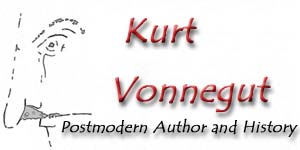''Death of the
Author?''
Besides responding to the writing modes of black humorist and metafictional
elements, Vonnegut's novels are also related to contemporary critical discourse.
In critical theories, two influential essays, John Barth's ''The Literature
of Exhaustion'' (1967) and ''The Death of the Author'' (1968) by
Roland Barthes, comment on and respond to the ideas of the author in creative
literary works. Though John Barth does not directly focus on the discussion
of the author, he seems to claim the dead end of the author's creativity
and originality since the traditional forms have been exhausted. Barth
cites Borges's words that ''all writers are more or less faithful amanuenses
of the spirit, translators and annotators of pre-existing archetypes¡Kfor
one to attempt to add overtly to the sum of 'original' literature
¡K would be too presumptuous, too naive; literature has been done
long since'' (qtd. in Bradbury 80). Barth explains ''exhaustion''
that ''the used-upness of certain forms or exhaustion of certain possibilities''
and ''by no means necessarily a cause for despair'' should be stressed
(qtd. in Bradbury 70). The ''exhaustion'' of literature does not
mean that novelists will cease to have creative power. Instead, novelists
'' confront an intellectual dead end and employ it against itself to accomplish
new human work'' . It is, in other words, a rebirth rather than a dead
end that postwar novelists are engaged in. Barth concludes in ''The Literature
of Replenishment'' that ''the effective 'exhaustion'''
is ''not of language or of literature, but of the aesthetic of high modernism
. . . '' (qtd. in Bradbury 76). Waugh also echoes this point in her
Metafiction:
''There has been paranoia, on the part of both novelists and critics for
whom the exhaustion and rejection of realism is synonymous with the exhaustion
and rejection of the novel itself'' (7). Barth's idea of turning exhaustion
into replenishment is exactly what I see in Vonnegut's novels and the major
argument of this thesis.
Roland Barthes in his essay ''The Death of the Author,'' (1968) also
directs his attention particularly to the concept of the author. The concept
of ''death'' can be ''paradoxical'' as Waugh suggests in the
practice of metafiction writing that the author is sometimes presented
explicitly as the creator of the narrative and thus the authorial power
is exaggerated rather than disappears (133). But the essay seems to make
an announcement that we do not need the author anymore. By regarding the
act of writing as intertexuality, which is'' a multi-dimensional space
in which a variety of writings, none of them original, blend and clash,''
and ''the text is henceforth made and read in such a way that at all its
levels the author is absent.'' I think ''the abscence'' refers
to the refusal to regard the author of the text as the source and origin
of the meaning, since the essay is based on the linguistics concepts of
deconstruction that meaning ''has no other origin than language itself,
language which ceaselessly calls into question all origins'' (146).
However, the absence of the author as an actual person and the inscription
of the author as a sign, I think, actually corresponds to the formation
of some metafictional strategies, which allows more possibilities to the
act of writing in the social and political context of American culture.
Unlike Barthes' view of textuality, moreover, Vonnegut's fictional construction
is never a system of endless language game which aims to expose the fictionality
of the work only. Though technically, Vonnegut does share the writing modes
of metafiction with his contemporaries, such as John Barth and Robert Coover,
Vonnegut also locates his novels closely within the contexts of American
social and cultural realities. Vonnegut's experimental spirits are not
merely directed to forms and styles, or to play with '' various possibilities
of self-reflection'' as Barth does in Lost in the Funhouse
(Hilfer 130). Nor is Vonnegut like what Hilfer suggests of Robert Coover:
'' . . . a writer sometimes exemplifies . . . occupational hazard of writing
that is more interesting in its narrative concepts than in its stylistic
execution of them . . . where the criticism of the book is somewhat more
interesting than the book itself'' (145). In SF, Vonnegut
deals with the historical experience of the Dresden bombing and its relationship
with writing. As in BC, Vonnegut confronts the social and cultural
decadence of American society with the predicament of the author surrogate.
Vonnegut's flaunting of his work as an artifact often has a strong parallel
and connection to the presentation of his thematic concerns on the predicament
and disasters of human beings.
Of Theme and Form
Consequently, in my thesis, I will argue that Vonnegut collaborates
his narrative forms or writing strategies with his thematic concerns, and
that none of these two aspects can be discussed separately. I do not follow
the prevailing literary trend that ''[l]iterature was being considered
less in thematic, more in formal terms,'' (Hilfer 127) which is usually
found in some of the writings of Vonnegut's contemporaries, I think, is
the last thing we can find in Vonnegut's works of fiction. I agree with
William Rodney Allen that:
[Slaughterhouse-Five] captured the imaginations of enough readers¡Xespecially
young ones¡Xto make Vonnegut for a time the most popular writer in
the country. Perhaps not since Uncle Tom's Cabin had a work
of fiction so deeply affected the public's perception of an ongoing American
war. If, as Lincoln famously remarked, Harriet Beecher Stowes's novel helped
start the Civil War, then Slaughterhouse-Five¡Xalong with
non-fictional events like the Tet Offensive and Kent State¡Xhelped
get the United States out of Vietnam. (ix)
Though my thesis is not focused on the social influence of Vonnegut's novels,
I should stress that while Vonnegut's novels correspond theoretically to
the metafictional writing techniques, they also show Vonnegut's deep attachment
and concerns with the social and historical environment of the time. |

